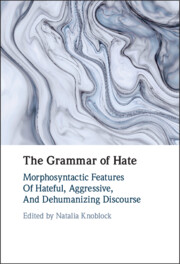Book contents
- The Grammar of Hate
- The Grammar of Hate
- Copyright page
- Contents
- Figures
- Tables
- Contributors
- Acknowledgments
- Introduction
- 1 Animacy and Countability of Slurs
- 2 Language Aggression in English Slang: The Case of the -o Suffix
- 3 Adj+ie/y Nominalizations in Contemporary English
- 4 Grammatical Gender and Offensiveness in Modern Greek Slang Vocabulary
- 5 Unseen Gender
- 6 The Neutering Neuter
- 7 Neutering Unpopular Politicians
- 8 The Power of a Pronoun
- 9 Is Play on Words Fair Play or Dirty Play?
- 10 Expressive German Adjective and Noun Compounds in Aggressive Discourse
- 11 ‘Kill the Invaders’
- 12 ‘I am no racist but …’
- 13 Homophobic Space–Times
- Index
- References
2 - Language Aggression in English Slang: The Case of the -o Suffix
Published online by Cambridge University Press: 30 June 2022
- The Grammar of Hate
- The Grammar of Hate
- Copyright page
- Contents
- Figures
- Tables
- Contributors
- Acknowledgments
- Introduction
- 1 Animacy and Countability of Slurs
- 2 Language Aggression in English Slang: The Case of the -o Suffix
- 3 Adj+ie/y Nominalizations in Contemporary English
- 4 Grammatical Gender and Offensiveness in Modern Greek Slang Vocabulary
- 5 Unseen Gender
- 6 The Neutering Neuter
- 7 Neutering Unpopular Politicians
- 8 The Power of a Pronoun
- 9 Is Play on Words Fair Play or Dirty Play?
- 10 Expressive German Adjective and Noun Compounds in Aggressive Discourse
- 11 ‘Kill the Invaders’
- 12 ‘I am no racist but …’
- 13 Homophobic Space–Times
- Index
- References
Summary
Slang is generally considered an unconventional vocabulary characterized by connotations of novelty, informality, and even derogatoriness or offensiveness. As such, it can be used as means of social exclusion and verbal aggression. The derogatory character of slang is particularly evident in its innovatory lexicon, as well as in the metaphorical extensions of its vocabulary. This study adopts a morphopragmatic approach to analyse slang words. In particular, it focuses on the usage of the suffix -o in offensive and aggressive contexts with nefarious intent, as in the words sicko, lesbo, or commo. The study is both dictionary-driven and corpus-based. Data selected from Green’s Dictionary of Slang have been collected in order to investigate how the -o suffix is utilized in hate communication to denigrate, dehumanize, and marginalize groups or individuals. Contextualized examples from COCA are analysed from the quantitative and qualitative viewpoints with the aims to: 1) identify the genres and environments where the -o suffix finds its preferred application, 2) investigate the most common collocational patterns where slang -o words convey a pragmatic meaning [aggressive], and 3) show the specific connotational meanings/pragmatic effects contributed by the -o suffix.
- Type
- Chapter
- Information
- The Grammar of HateMorphosyntactic Features of Hateful, Aggressive, and Dehumanizing Discourse, pp. 34 - 58Publisher: Cambridge University PressPrint publication year: 2022
References
- 3
- Cited by

